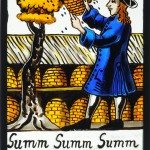Fri, 28 March 2014
You’ll also learn: * The reason why Memory Palaces may have originated in ancient China and not ancient Greece. * An introduction to the Person Action Object system … and why I don’t use it! More on that topic on this episode of Magnetic Memory Method Live on YouTube:
The video was inspired, in part, by the following email: I’d love to ask for your advice on a PAO system I am working on for my family to use: Background: I have thought about encoding 8 to 12 digits along a journey in each location by using an enhanced PAO system from 0-99, I call PACO (Person, Action, Object + a Container) The container is a different kind of object that only works because I ensure the types are mutually exclusive. I plan to later add a discrete food object and a discrete pet to each double digit as well. See the list below for example. The rationale for this is that I work in a data intensive industry (valuing and helping to buy/sell companies), where memorizing many figures, stats, and historical charts would be of great use. I’m not as interested in rapidly memorizing a deck of cards, though I wouldn’t mind spending some time on that later… To support this system, I follow certain restrictions:
My long term thought is that I can have a person doing an action on an object frozen in my mind inside of a container. Each of these PACOs could be eating a food and own a pet. Thus, in one loci, if it is graphic and memorable enough, I can encode up to 6 double digit items. I’m just wondering if this is overkill and what may be the best way to get my brain to internalize the PACOs. My question is, should I develop a separate journey of 110 location (perhaps 11 rooms of 10 loci), which I use to memorize the PACOs? Also, if I start with just the traditional PAO and add the additional C later, will that be counterproductive to just memorizing all the options up front? Do you have any other advice on how I can most effectively internalize the system, so that I just about think of pictures in place of double digits? Thank you for any thoughts on this topic! Thanks for the question. Everything is covered in this episode of the podcast and this YouTube Live. Now back to … * Why you really aren’t using memory techniques at all if you don’t have a location-based strategy involved in the mix. * How to use Magnetic Bridging Figures and Word Division to maximize your use of mnemonic locations in your Memory Palace network. * Why you must always use a Memory Palace whenever exploring the possibilities of memory techniques. * Why competing in memory competitions isn’t for everyone (memory champions still make mistakes, after all!). * Why you need a method – not necessarily a system – that will work for you with respect to the specific memory goals you are trying to pursue. * Why the Magnetic Memory Method is a way of thinking about information storage and retrieval as a kind of way of life. * Why location-based memory strategies are the best for easing information into long term memory. * Why you don’t need to memorize long string digits of numbers in order to “prove” that you are succeeding with memory skills. * Why you need to join the mnemotechnics.org community immediately – but only if you’re going to apply what you learn from the community. * Why YOU are the best person to teach memory techniques to the young people in your life. See also Tap the Mind of a 10-Year Old Memory Palace Master. * Two amazing resources for introducing young people to mnemonics. * The unbelievable connection between bumblebees, serial killers, graffiti and location-based memory techniques. * … and much, much more! Thanks as always for your interest in the Magnetic Memory Method Podcast, videos and the Magnetic Memory Method Masterclass. I appreciate your interest in the PAO very much and look forward to further interesting questions about it. In the meantime, if you struggle with it or find that it’s simply not for you, check out the Major Method. It might work better for you. Until next time, have fun and keep yourself Magnetic! Sincerely, Anthony Metivier The post MMMP 013: The Amazing Relationship Between Memory, Serial Killers And Bees appeared first on Magnetic Memory Method - How to Memorize With A Memory Palace.
Direct download: MMMP_013_The_Amazing_Relationship_Between_Memory_Serial_Killers_and_Bees.mp3
Category:Podcast -- posted at: 10:17pm EDT |
Mon, 17 March 2014
Listen now and you’ll learn: * The precise connection between language learning and addiction so that you can use the highs to accomplish all of your fluency goals and the secret origins of why Sam named his site directly from the influece of Konglish. * How to get “addicted” to language learning even if you don’t like to study or think language learning is too hard. * How to get to know yourself before you start learning a new language. * The three most important questions you need to ask every time you come up against a language learning barrier. * Why being born bilingual is not always useful when it comes to further language study. * Why you should never try to go it alone with just grammar guides and traditional textbooks. * The important role of curiosity in all language learning and how to develop it so that you can zoom through some of the harder aspects of language learning. * How language learning can lead to finding new friends and even the love of your life. * Sam’s insightful approach to David Mansaray’s distinction between learning a language on your own and being a self-directed learner. * Exactly what to do to learn a language without having to rely on teachers, classrooms and dusty old textbooks (though you’ll still want at least some kind of textbook and Sam has great recommendations for how to choose them). * How to build your confidence by using the right incentives so that you can blast into success. * How to avoid burnout and still maintain consistency. * Sam’s amazing Mount Fluency metaphor and how to use it as a “point” of inspiration in your climb towards the top of your target language. * What to do when you reach an intermediate level and need extra motivation to keep going. * Sam’s favorite spice in the kitchen of language learning. * The power of using multiple news media channels to experience massive boosts in fluency. * Why you need to realize that you can easily become more fluent than a five year old in his or her mother tongue and why you should never get stuck in thinking less of yourself if you can’t immediately talk about world events such as what’s going on in Ukraine. * Why language and culture are really inseparable and how to exploit this fact in order to learn more about your target language and start using it quickly. * Sam’s response to Luca Lampariello’s “ephiphany moment” concept. * How to avoid getting bogged down in the words of the language by focusing on the message of each and every sentence you speak. * How to assess the strengths of different language learning programs and mix and match them to maximize the language learning benefits they offer (or should offer before you invest your precious time and money!) * When you should absolutely never use spaced-repetition software. * How to use the powers of inductive language learning as you are working towards what Sam calls a “rule-based” approach if you want to get to a very high level in your foreign language studies. * Precise ways to reward yourself every time you reach a language goal so that you feel refreshed, renewed and ready for the next level. * How to record yourself for maximum exposure to your own use of the foreign language so that you can analyze your progress and go even further and deeper into the language learning process and literally “mold” your ears as you fine tune your approach. * How to avoid learning the rules for things you haven’t been exposed to yet so that you don’t get frustrated and quit. * Why you should never approach language learning as homework. * How to avoid rigid thinking when it comes to language learning. * … and much, much more. +Anthony Metivier is the founder of the Magnetic Memory Method, a systematic, 21st Century approach to memorizing foreign language vocabulary, dreams, names, music, poetry and much more in ways that are easy, elegant, effective and fun. The post Sam Gendreau Talks About How To Get “Addicted” To Language Learning appeared first on Magnetic Memory Method - How to Memorize With A Memory Palace.
Direct download: Magnetic_Memory_Method_Podcast_011_Sam_Gendreau.mp3
Category:Podcast -- posted at: 3:40pm EDT |
Thu, 6 March 2014
Listen to this episode of the Magnetic Memory Method Podcast right now to learn: * The difference between self-education and self-directed learning and how to be proactive about your own education so that you can grow in the direction you want without hassle. * The best way to use writing to refine your language skills so that you can experience boosts in fluency faster and with greater ease. * Why you should avoid word frequency lists when learning a foreign language and what to do instead to build a massive (but targeted) vocabulary. * How to learn to communicate at a deeper, conceptual level in your target language (as well as in your own mother tongue!) * The real secrets to becoming a “hyper-polyglot.” * Why observation is just as important as taking instructions when learning from other people. * Exactly what a mentor is and why you need one to help you clarify your thinking and decisions so that you can live an informed and positive life. * How to deal with negativity and fear so that you can pursue your goals with an open mind and daring spirit. * The importance of emotions and excitement in learning and how to generate them immediately. * David’s thoughts on the uses of Memory Palaces, Moonwalking with Einstein and other memory techniques, including a unique way to use streets as Memory Palaces when learning a new language. * … and much, much more. Got questions about David Mansaray, the Magnetic Memory Method Podcast or memory in general? Get in contact, subscribe to the Magnetic Memory Newsletter. +Anthony Metivier is the founder of the Magnetic Memory Method, a systematic, 21st Century approach to memorizing foreign language vocabulary in a way that is easy, elegant, effective and fun. The post David Mansaray On Passion, Polyglots and Positivity appeared first on Magnetic Memory Method - How to Memorize With A Memory Palace.
Direct download: MMMP_010_David_Mansaray_On_Passion_Polyglots_and_Postivity.mp3
Category:Podcast -- posted at: 4:27pm EDT |
The Magnetic Memory Method Podcast

Categories
generalMemory Improvement Tools
Memory Method Tips
Brain Exercises for Memory Improvement
Memory Improvement Case Studies
Podcast
Guest Post
Memory Palace Tactics
Practical Memory Techniques
Uncategorized
Improve Memory Q&A
Archives
AprilMarch
February
January
December
November
October
September
August
July
June
May
April
March
February
January
December
November
October
September
August
July
June
May
April
March
February
January
December
November
October
September
August
July
June
May
April
March
February
January
December
November
October
September
August
July
June
May
April
March
February
January
December
November
October
September
August
June
May
April
March
February
January
December
November
October
September
August
July
June
May
April
March
February
January
December
November
October
September
August
July
June
May
April
March
February
January
December
November
October
September
August
July
June
May
April
March
February
January
December
November
October
September
August
July
June
May
April
March
February
January
December
November
October
September
August
July
June
May
April
March
February
January
December
November
September
| S | M | T | W | T | F | S |
|---|---|---|---|---|---|---|
| 1 | ||||||
| 2 | 3 | 4 | 5 | 6 | 7 | 8 |
| 9 | 10 | 11 | 12 | 13 | 14 | 15 |
| 16 | 17 | 18 | 19 | 20 | 21 | 22 |
| 23 | 24 | 25 | 26 | 27 | 28 | 29 |
| 30 | 31 | |||||
Syndication

 In this episode of the Magnetic Memory Method Podcast, you’ll learn about the amazing connection between location-based memory strategies, serial killers, graffiti and bumble-bees.
In this episode of the Magnetic Memory Method Podcast, you’ll learn about the amazing connection between location-based memory strategies, serial killers, graffiti and bumble-bees.
 In this episode of the Magnetic Memory Method Podcast,
In this episode of the Magnetic Memory Method Podcast,  In this episode of the Magnetic Memory Method Podcast, renowned polyglot and language learning expert David Mansaray (
In this episode of the Magnetic Memory Method Podcast, renowned polyglot and language learning expert David Mansaray (